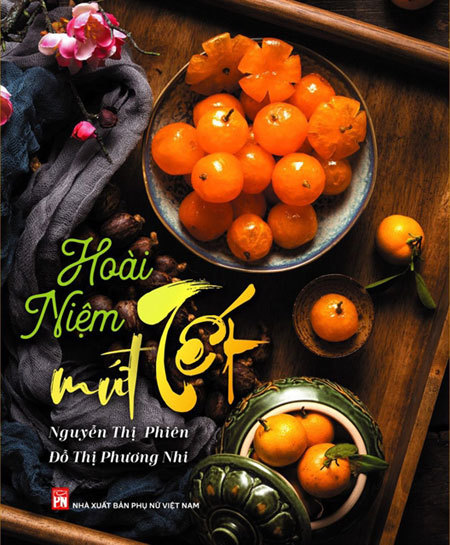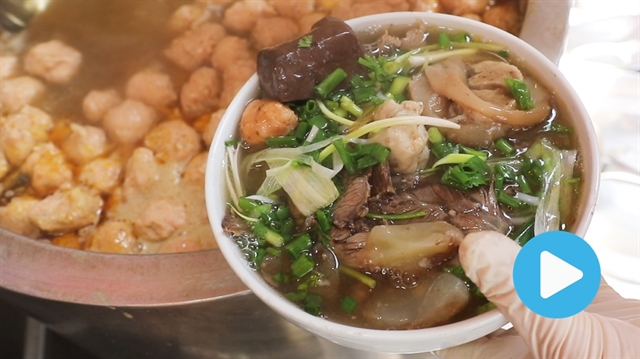 |
| The cover of Hoài Niệm Mứt Tết (Vietnamese Sweet Dishes served in Lunar New Year), a book featuring homemade mut in Hue style served by Vietnamese families during the Tet holiday. The authors are Nguyen Thi Phien and Do Thi Phuong Nhi, female culinary experts from Hue City. The book has been released by the Vietnam Women Publishing House. (Photo courtesy of the publisher) |
The book, titled Hoài Niệm Mứt Tết (Vietnamese Sweet Dishes served in Lunar New Year), features homemade mứt in Hue style served by Vietnamese families during the Tet holiday. Traditional sugared kumquat, lotus seeds, coconut, squash, soursop and sweet potato are highlighted.
The book includes recipes by the authors who use simple and lively language to express their knowledge and feelings about Vietnamese culture and lifestyle through food. Photos of mut are also included.
“Our book, Hoài Niệm Mứt Tết, features our love for Vietnamese food. Each dish of mut that we introduced in the book represents our memories on our grandmother and mother who educated our siblings to love and keep our tradition of cooking mut every Tet,” said author Do Thi Phuong Nhi, at the book launching event in HCM City in early January.
"Traditionally, Vietnamese like mut preserves during Tet. They believe the sweet flavour will bring good luck in the New Year.”
“For readers who have not experienced the sweet taste of mut, we hope our book leaves a fresh impression, and new and useful information about Vietnamese dishes,” she said.
Nhi and Phien, who work for tourist schools and cultural centres, have offered cooking courses for many Vietnamese and foreigners.
They released Món Ngon Xứ Huế (Best Dishes in Hue Style) and Món Ngon Xứ Huế - Hue Delicacies, two books featuring delicious dishes from Hue, in HCM City in 2018 and 2019.
Food capital
Local authorities from the central province of Thua Thien-Hue last year launched a plan to make Hue the food capital of Vietnam. Under the plan, Hue cuisine will have its signature dish, and the city’s specialty dishes will get their own trademarks. Authorities, researchers and businesses will work closely to develop the brands.
The city’s government has worked to carry out the first steps and has earned a warm response from residents and people who love Hue food around the world.
The province’s Department of Tourism has signed a co-operation memorandum with Đại Nam – Thái Y Viện, a local company focusing on areas like food and tourism to introduce Hue cuisine. Restaurants and eateries around the city serving authentic Hue dishes are encouraged to put up signature boards for visitors to recognise them.
Many forums, conferences and talks highlighting the food culture of Hue, the former imperial capital of Vietnam, have been organised to develop tourism.
Tour programmes offering visitors a chance to taste and explore local cuisines have been launched. Tourists will be able to visit lagoons and farms, and traditional markets where ingredients for local dishes are harvested and offered. Then, they will observe the preparation and cooking process. They will also learn about Hue’s gastronomy by sampling local folk-style, royal-style and vegetarian dishes.
A food museum with study and display areas and a zone for watching culinary performances and buying food will be built.
Tran Huu Thuy Giang, deputy director of the Tourism Department, said that local authorities are working with partners from HCM City to build a museum for Hue food. “Building a museum for Hue gastronomy is a must. We hope the museum will help visitors learn about Hue culture and lifestyle,” he said.
“Hue is a food paradise where you can buy a delicious dish for only US$0.50,” said Vietnamese-American Hoang Huyen, who visited Hue last year.
“I like che (sweet soups) in various flavours such as green bean, fruit and corn, or all mixed together. A bowl costs VND10,000 ($0.40).”
Besides che, Hue has many kinds of sticky rice dumplings, including banh beo and banh bot loc, that visitors should not miss. Com hen (oyster rice and noodles) and banh canh (thick noodle soup) are among the must-try dishes.
Many vendors and roadside stalls offer unique Hue dishes late at night.
The capital of the country under the last monarchy, the Nguyen Dynasty (1802-1945), Hue was a centre of Vietnamese gastronomy as top chefs from different regions moved there to serve the royal family. Today, the city is known as the home of about 1,700 of the country’s 3,000 dishes.
Thu Anh (VNS)

Vietnamese food: Hue beef noodle soup
The noodle soup can taste a little different in Hanoi compared to the authentic Huế dish, but some say they prefer the lighter broth and heartier portion of toppings.

Hue cuisine for no more than 50 cents
The central town of Hue, Vietnam’s former imperial capital, is a food paradise where you can buy a delicious dish for US$0.50.